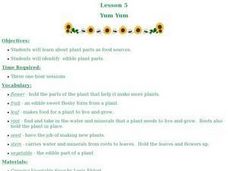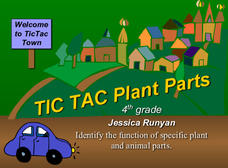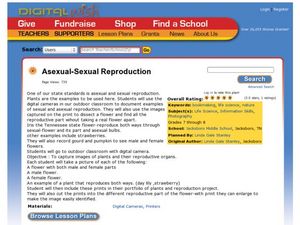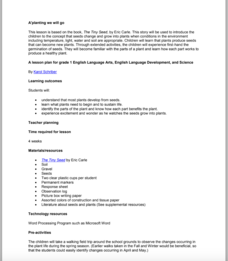Curated OER
Giant Smelly Plant Attracts Thousands
Read and discuss a news article about a rare corpse plant that bloomed in Washington D.C. Because this native Indonesian plant blooms so rarely, people flock to see it. After reading the article, your class answers comprehension...
Curated OER
The Great Pollinators
Students discover the reproductive parts of a plant. In this biology lesson, students identify and categorize several different plants they dissect in class. Students record their information using a data chart.
Curated OER
Learning the Parts of a Plant
First graders discover the anatomy of a plant by labeling a picture. In this botany lesson, 1st graders examine and dissect several real plants in class and define their different parts. Students utilize the Internet to view...
Curated OER
Yum Yum: Making Vegetable Soup
Young scholars investigate agriculture by reading a book. In this plant life lesson, students read the book Growing Vegetable Soup by Louis Ehlert, and examine the ingredients used in the book's soup. Young scholars create an...
Curated OER
Tic Tac Plant Parts
This plant biology PowerPoint introduces plant parts and their functions. This PowerPoint allows students to identify each plant part on a diagram, along with its' function. The slides contain a clear explanation of how each plant part...
Curated OER
Build a 3-d Plant Model
Third graders construct a three-dimensional model of a flowering plant. They examine the major plant parts and their basic functions. They demonstrate an understanding of the similarities and differences in the physical...
Curated OER
Yummy Plant Parts
Students examine plant parts. In this botany lesson, students examine various edible plants and how their adaptations help them to grow. They observe stems, leaves, roots and flowers of plants and discuss the relationship between the...
Curated OER
Sunflower Sundance
First graders study sunflower plants and identify its parts. They plant sunflower seeds and watch them grow and make sunflowers out of paper plates and colored paper. They watch videos and visit websites about sunflowers.
Curated OER
Asexual-Sexual Reproduction
Eighth graders examine the reproductive organs of plants. For this plant reproduction lesson, 8th graders identify the reproductive organs of different plants using a digital camera. Students create a plant portfolio of images large...
Curated OER
Plant Parts And What They Do (5.2)
In this identifying plant parts and what they do worksheet, students answer multiple choice, true and false, and fill in the blanks with the best vocabulary words. Students write fifteen answers.
Curated OER
All About Seeds!
How do fruits relate to flowers and seeds? Identify the seeds and their purpose with a coloring activity for kindergartners. Once they color the seeds of apples, bananas, and peas (among others), kids get hands-on experience with bean...
Chicago Botanic Garden
Preparing for Project BudBurst
Plants take cues from the environment—change in daylight hours and temperature—to complete their seasonal life cycles. Lesson four in the series of six has classes collect phenology data on plants. After taking initial observations,...
Curated OER
Outdoor Seed Sowing
First graders identify vegetables and flowers that can be grown from seed. In this seed sowing lesson, student learn the correct spacing and planting of various types of seeds. Students label plants.
Curated OER
Prairie Find Outdoors
Pupils take a field trip to a local prairie. Using identification books, they identify various forbs and grasses in the prairie. As a class, they discuss the importance of forbs and grasses to the ecosystem and review the various types...
Curated OER
Terrariums: A Look at the Living and Nonliving World
Third graders examine life in a terrarium and relate it to life in a larger environment. In this terrarium lesson, 3rd graders examine how living and non-living things work together by examining the changes in a terrarium. They make...
Curated OER
Seed Structure and Seed Dispersal
Third graders plant seeds. In this seed structure lesson, 3rd graders identify parts of a seed and plant a lima bean seed. Students discuss and reflect on the process in their journals.
Curated OER
Who Will Benefit if We Give Bulbs What They Need to Grow?
Learners identify the elements needed for bulbs to grow. They raise tulips and give them to various members of the community. They identify local philanthropic communities and look for ways they can constructively donate time and give...
Curated OER
Introduction To Floral Morphology
Students create a model of the four basic whorls of flowers using a water bottle, construction paper and Q-tips. They then examine fresh flower specimens to see how the basic structure can vary in different species of flowering plants.
Curated OER
Plants
Students identify and label parts of a plant. They will construct a plant from art material and describe the purpose of each part for the plants survival. Students author a book with pictures and words or a story about a plant.
New South Wales Department of Education
Plant Groups
Bryophytes can grow in temperatures just above zero degrees. This 17th installment in a series of 20 introduces learners to the five groups of plants: algae, bryophytes, pteridophytes, gymnosperms, and angiosperms. Classes then explore...
New South Wales Department of Education
Plant Features
Pine needles are actually modified leaves. In the 16th installment of 20, young scientists explore plants. Through an analysis of leaves — shape, veins, and edges — pupils see how to classify plants based on structural features.
Curated OER
A'planting We will Go
Germination is an amazing process that results in amazing things. The book The Tiny Seed is the inspiration for a set of activities that will help build early literacy, observation, language, and writing skills. The class observes how...
Desert Discoveries
Who Depends on the Saguaro?
Young scientists design a picture of a saguaro cactus that shows the cactus and some of the animals and plants that interact with it. There are many of these special relationships between plants and animals of the Sonoran Desert. Your...
Curated OER
Bursting Blooms- Create an Early Spring
Students prune a tree. In this gardening lesson, students select a shrub or tree that has a lot of flower buds and use sharp pruners to cut sections of branches. Students place the cuttings into cool water and move into a bright...

























